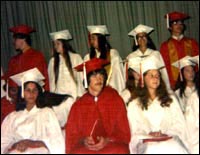
|
|
Three examples come to mind immediately. And parents and students should pay close attention to these. The first example arose before my teaching days, while I was working at a local hospital and considering applying to a graduate-level program in the health field. One of the doctors there gave me a wonderful piece of advice. He said that if I was thinking about graduate school or medical school, I should keep this story in mind, one that he made a point of telling younger students. A few years back the doctor had been on an admissions committee for a medical school. On one occasion he had read—mirabile visu—a one-sentence letter of recommendation: "I was asked to write a letter of recommendation and this is it." He went on to explain that the letter had completely undone the student's chances of gaining acceptance to medical school on that occasion. To be sure, there were no negative words written about the student. But without following normal protocol, without writing anything at all about the student, the letter accomplished what the writer obviously had intended.
What lesson did I learn from this story? That I should always ask beforehand if a person felt that he or she could write a strong letter of recommendation for me. When I finally prepared my own applications for graduate school, I remembered that story and thus ensured that all of my recommendations assisted my application. Now, for the second story. One of my high-school students was absolutely brilliant, a once-in-a-lifetime student for most teachers. He was a National Merit finalist, a math-team anchor, on the debate team, and a cross-country runner, to illustrate a few of his many outstanding academic qualities. His character and work habits mirrored his academic performance—integrity beyond reproach, consistent and thorough preparation for every class, and an all-round great person. He applied to the school of his choice and was accepted, but without any scholarships. "What happened?" his father asked me at one of the parent-teacher conferences. Since I hadn't been asked by the son to write a recommendation, I didn't know for sure what had happened. It was my opinion that his son should have received a full scholarship, and that most colleges would vie with each other to secure such a student. That was the truth. The father, who was a professional, had forwarded copies of his son's application to colleagues in Washington for review when the son didn't receive any scholarships. They had agreed with my assessment. But what I didn't tell the father is that his son had probably not selected the best teacher(s) to write letters of recommendation. The student, on the surface, did nothing wrong. Nor could he—or his father--have been expected to understand the intricacies of writing letters of recommendation among high-school faculty. Under their particular circumstances they should have been able to expect a strong letter of recommendation. Next Page: Key Questions Every Student Should Ask |
|

